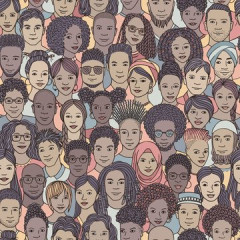Could you first introduce yourself to the reader?
My name is Natalie Clarke, and I’m the Project Coordinator for Bubbly Young Theatre Makers at London Bubble Theatre Company, Festival Coordinator at Lewisham Education Arts Network, and a Freelance Creative Events Manager
What does your job involve? Give us the typical outline of a day?
At London Bubble, I support the project leader across our extensive youth programme. That could mean contracting staff and young people involved in projects, coordinating dates and times for events with schools, charities and organisations, compiling monitoring data for each of our projects and creating evaluation reports, supporting our facilitators in creative sessions, managing petty cash and helping with admin task. There is no typical day it really depends on what projects are running, what’s needed of me, who is in the building etc.
Similarly, with LEAN and in my freelance roles it can be a day in the office with admin, a day of meetings and strategy making, a day on site from 4am managing contractors, a day supporting hundreds of children performing in their first professional show.
There is no typical day it really depends on what projects I am running or supporting, what’s needed of me, who is in the building, how much time I have J.
It’s fun to always have that change and flexibility.
What’s great about your job?
With Bubble it’s that, I get to hang out and run projects with some of the coolest young people regularly, watch great theatre they have devised, and find opportunities for them to join us for paid work and development opportunities. Across all of my roles, I also love that I am always learning new things; not just about theatre or performance but about working with young people, mental health, criminal justice, school curriculum … the list is endless.
What are the bits you don’t like or find challenging?
Well there are always tasks that are a bit tedious, but that’s usual in any job role I think. Basic admin tasks and data entry can be very dull, but important (and sometime it’s nice to have an easier task to do when in a very busy period).
I think for me, some of the reporting on all the work we do can be challenging. A lot of the work and support we offer can’t be quantified well, so it’s hard to tell the full story in evaluation reports.
What are the highlights of your career to date?
Umm wow, so many!
Being lifted out of a safety boat on the River Thames by members of Toi Moari (a community organisation from New Zealand who promote Moari culture) after they had crewed a traditional waka past the Tower of London.
Working with a group of students to paint a 3D black hole mural outside Rochester Station in Kent to launch my own theatre and arts festival “Paint The Town”.
And I think working on a youth dance event on London’s Southbank and overhearing one of the participants saying it was the best day ever, that they didn’t realise that someone like them could achieve that – that has always stuck with me and spurs me on to keep making these exciting opportunities available to young people.
What was your career path into this job? Have you also worked outside the arts?
Without going into detail, I wanted to be a musical theatre performer, then realised I didn’t really, then did a degree in theatre and masters in production management. I wrote to the Greater London Authority on a whim to see if I could help out on a dance festival, and ended up working with them for nine months.
After that I got the festivals bug and worked/volunteered/interned on all the festivals I could. I then went to work with Watford Borough Council for about two years on their outdoor events programme, before switching gears and deciding to return back to working on youth based projects. I was lucky enough to start working with Lewisham Education Arts Network to coordinate Lewisham Live (a youth festival of Music and Dance), and that led to work at the Horniman Museum and Gardens, and then London Bubble. Now I juggle roles at LEAN and London Bubble, alongside freelance projects.
I have worked outside of the arts planning and managing corporate events for communications company, and in partnership with UEFA for the Euro 2012 Championships – but community activity is always where I have felt more comfortable.
Can you describe your biggest challenge so far in your career? How did you overcome it?
I think my biggest challenge was leaving Watford Council after two years full time, and not having a clue what would be next. I felt that what I was doing didn’t fit me anymore and I wasn’t learning anymore, and that led me to doubt my abilities and lose confidence in myself.
I took time out. Some time to catch up with everything and just to step away from all the worries. I focused on reminding myself why I got into this career in the first place, and which elements of it I loved or wanted to do more of. Young people and community kept coming up so I looked at more targeted training, co-launched a community theatre and arts festival in Kent, and was lucky enough to find roles that had young people at its heart.
Have you noticed any changes in the industry? If so, what?
I think with cuts, funding is harder to come by than perhaps it was previously, and you now need to show more need and more evidence for why you should get funding than anyone else. That’s not always a bad thing as it pushed organisations to really think about how and why they are running a project but it can also mean trying to find ways to evaluate outcomes that are hard to put on paper.
I think there is now more focus on how creative activity can support wellbeing which is great. There is much more research around this and people link the two.
I think from a freelance events perspective there is also more requirements for you to have more breadth of knowledge. So, knowing how to run an event safely is great, but ideas of how to market it, link in to the local community and feed into wider area policy is much better.
You’ve been granted the ability to send a message to 16-year-old you. What do you say?
This too shall pass.
In essence, some of the things that right now seem the most upsetting, stressful, difficult, life-changing – like exams, or part-time jobs, or squabbles with friends, arguments with parents, or boy troubles – tomorrow they will seem smaller, and the next day you won’t notice them at all. There will always be horrid times, but they can and will pass.
Do you have any advice for young people interested in doing your kind of job?
Buy a diary – you will definitely forget where you are meant to be and what you are meant to be doing when it gets busy.
Listen to your body. Take time out and time to rest or you will crash (it’s much easier said than done).
Jump at every chance to learn, you never know where that course or nugget of information will come in handy.









0 Comments